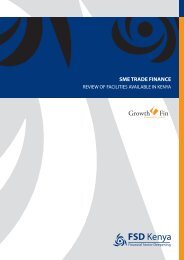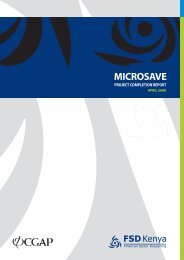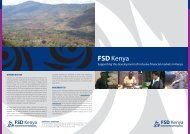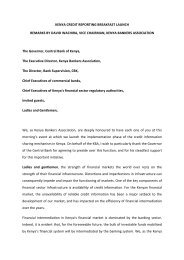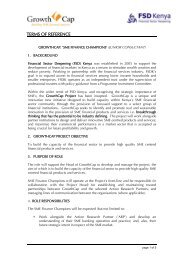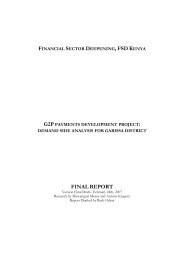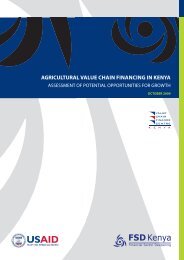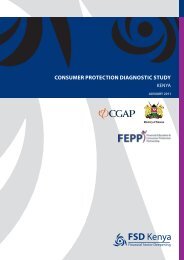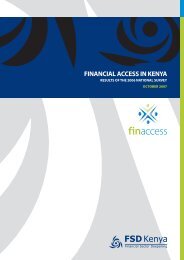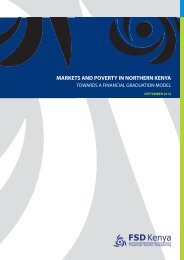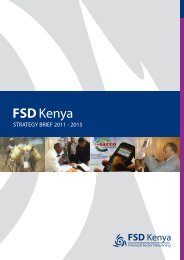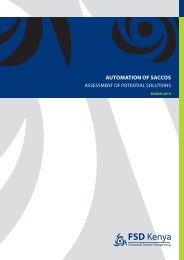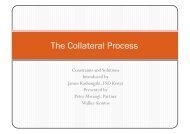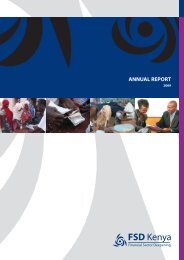fsd's financial education programme: evaluation and ... - FSD Kenya
fsd's financial education programme: evaluation and ... - FSD Kenya
fsd's financial education programme: evaluation and ... - FSD Kenya
Create successful ePaper yourself
Turn your PDF publications into a flip-book with our unique Google optimized e-Paper software.
12 • <strong>FSD</strong>’S FINANCIAL EDUCATION PROGRAMME: EVALUATION AND RECOMENDATIONS<br />
The <strong>evaluation</strong> team was informed that these modules had not been reviewed<br />
within <strong>FSD</strong> <strong>and</strong> as such had not been disseminated to the organizations that<br />
took part in the adaptation. It would therefore seem that the action plan<br />
developed by the group at the second workshop was never implemented.<br />
2.7.4 Development of a <strong>financial</strong> <strong>education</strong> curriculum<br />
It appears that two sets of curricula were developed:<br />
•<br />
modules adapted for the pilots by Faulu <strong>and</strong> Equity<br />
• public sector modules (discussed above)<br />
The <strong>evaluation</strong> team is of the opinion that a significant opportunity to<br />
disseminate the material widely was lost. Even now, two years later, there<br />
would be considerable merit in making the modules available to a wide range<br />
of potential users – such as <strong>financial</strong> service providers, <strong>education</strong>al institutions<br />
<strong>and</strong> NGOs.<br />
2.7.5 Creation of a <strong>financial</strong> <strong>education</strong> website<br />
A FEPP website was created as a communication <strong>and</strong> dissemination tool<br />
(www.fepkenya.org). It is very informative, although there is little reference<br />
to CP.<br />
As no-one has been driving the FEPP since January 2011, it is now somewhat<br />
dated. This is symptomatic of the absence of a national-level institutionalised<br />
body to take ownership of FE <strong>and</strong> CP in <strong>Kenya</strong>. Ideally the ownership of this<br />
website should be shifted away from the <strong>FSD</strong> <strong>and</strong> placed with a national<br />
secretariat/ unit.<br />
In the interim, the <strong>FSD</strong> should place the following on the website: the outcomes<br />
of the Naivasha workshop <strong>and</strong> materials subsequently developed (such as the<br />
curricula); progress made with CP; <strong>and</strong> an indication that Phase 1 of the FinEd<br />
<strong>programme</strong> has been closed <strong>and</strong> that the <strong>FSD</strong> is considering its next steps. In<br />
future, the website could further evolve to include more pragmatic technical<br />
advice (‘how to’) <strong>and</strong> content. It could also be exp<strong>and</strong>ed to include more links<br />
to other relevant sites.<br />
2.8 Roles <strong>and</strong> Links<br />
The FinEd set out to build several links with key players in the market, both<br />
government <strong>and</strong> private sector. While most of these stakeholders participated<br />
in the FEPP <strong>and</strong> some were involved in the pilots, limited lasting links were<br />
built. As stated previously, ownership of the FEPP then also vested with the<br />
<strong>FSD</strong>/FinEd <strong>and</strong> not with these stakeholders. Perhaps the intent was never to<br />
transfer ownership, as the purpose of the links (as described in Table 7) was<br />
primarily participation – not leading.<br />
The most important outcome of the FinEd/FEPP was probably to raise<br />
awareness on the issue of <strong>financial</strong> <strong>education</strong>. The Central Bank of <strong>Kenya</strong> has<br />
subsequently introduced a <strong>financial</strong> <strong>education</strong> working group at the Regulators<br />
Forum.<br />
2.9 Performance targets<br />
The FinEd project targets are presented in Table 8. While these were partially<br />
achieved in terms of the <strong>programme</strong> implementation (1-4), the targets for<br />
the stated objectives are, as with the pilots, essentially focused on reach<br />
(quantitative). The targets do not consider frequency, quality or content of<br />
messaging. In essence, the targets do not reflect the complexities of <strong>financial</strong><br />
<strong>education</strong>, the need for a targeted approach <strong>and</strong> repetition of multiple<br />
different messages. Different types of measures are required to assess<br />
different types of projects <strong>and</strong> activities <strong>and</strong> in future a more realistic <strong>and</strong><br />
practical M&E framework should be developed for a FinEd II <strong>and</strong> for its various<br />
components (such as specific <strong>programme</strong>s). There is much expertise in the<br />
market on monitoring <strong>and</strong> evaluating <strong>programme</strong>s, including media-based<br />
<strong>programme</strong>s.<br />
2.10 Specific questions in the ToR<br />
•<br />
Is there any evidence that conventional didactic models really result in<br />
behaviour change?<br />
The <strong>education</strong>al system is proof of both the effectiveness <strong>and</strong> limitations of<br />
didactic models. However, the application of didactic models is limited in the<br />
domain of <strong>financial</strong> <strong>education</strong>. The starting point of a national FinEd <strong>programme</strong><br />
should also not be the channel <strong>and</strong> form, but the target market, followed by<br />
the messaging <strong>and</strong> only then should the appropriate channel(s) be decided on.<br />
I.e. a detailed media plan (above-, through- <strong>and</strong> below-the-line) should be<br />
developed to serve the target market <strong>and</strong> content, not the other way around.<br />
•<br />
Would a focus on improving the quality <strong>and</strong> relevance of services<br />
provided by <strong>financial</strong> institutions produce greater impact?<br />
More customer-centric products <strong>and</strong> improved service delivery should definitely<br />
improve product uptake, but this is not a function of FE, <strong>and</strong> FE should not be<br />
measured through product uptake – marketing should.<br />
•<br />
How scalable are current approaches – is a national vision for <strong>financial</strong><br />
<strong>education</strong> realistic in <strong>Kenya</strong> at the current time?<br />
A national vision is certainly an option for <strong>Kenya</strong>, but would require starting at<br />
the beginning, i.e. by developing a national framework. The pilots are tactics <strong>and</strong><br />
should not be confused with a national vision.<br />
•<br />
How important is consumer protection <strong>and</strong> to what extent is this best<br />
achieved through improving awareness/caution among consumers or<br />
through regulatory oversight <strong>and</strong> enforcement?



